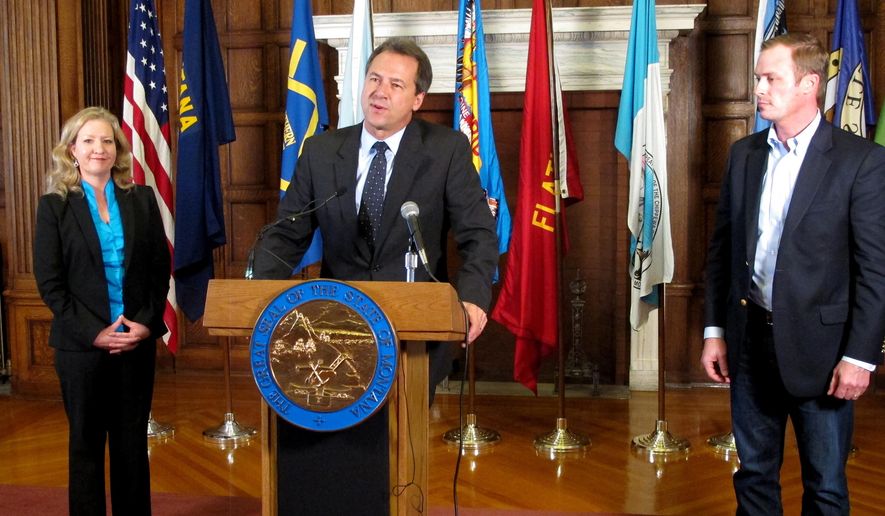Leading Senate Republicans pressed the administration Monday to explain how it plans to recoup $2.4 billion in loans to Obamacare’s troubled co-op program and whether customers will be able to find new plans without significant hiccups.
But on the good-news front for the administration, Montana agreed to expand its Medicaid program, making it the 30th state, plus D.C., to embrace a key pillar of the Affordable Care Act.
“The administration looks forward to working with other states to expand Medicaid by designing programs that meet states’ needs while providing needed services to residents and significant economic benefits to states,” Health and Human Services Secretary Sylvia Mathews Burwell said.
The mixed news came just a day after President Obama’s signature health law kicked off its third round of open enrollment in the exchanges, and as the administration is struggling to meet high expectations.
Officials have already signaled they’ll struggle to meet budget projections that had called for some 21 million exchange customers this year. Instead, the administration is projecting just 10 million paying customers in 2016.
But those that do log on to the federal HealthCare.gov portal should find a faster, easier-to-use website and new tools to calculate their out-of-pocket costs.
The co-ops, or Consumer Operated and Oriented Plans, are the latest target for Obamacare critics, after nearly half of the 23 programs set up under the law have failed. Arizona officials announced the end of their program Friday, and New York state said its program would close earlier than expected.
The co-ops were supposed to offer a nonprofit, consumer-oriented alternative to business insurance companies. But analysts say they had a hard time competing for market share. In some cases, claims outweighed what the co-ops took in through premiums, causing them to go belly-up.
“These non-profit, consumer-run health plans were intended to improve coverage, increase competition, and provide more affordable options. The CO-OPs are not living up to these expectations,” Senate Finance Committee Chairman Orrin G. Hatch, of Utah, and Senate Health Committee Chairman Lamar Alexander, of Tennessee, wrote in a letter to Andy Slavitt, acting administrator at the Centers for Medicare and Medicaid Services.
The Ways and Means Committee will hold a hearing about the co-ops on Tuesday, grilling Mandy Cohen, the chief of staff at CMS. On Thursday, the Energy and Commerce Committee will hear from Ms. Cohen and the Health and Human Services Department’s Office of the Inspector General.
Though under fire in Congress, the HHS claimed victory Monday as it approved Montana’s plan to expand Medicaid coverage to roughly 70,000 low-income residents.
The agency issued a waiver allowing Montana to charge premiums on enrollees who make more than 50 percent of the poverty level. Those premiums will be credited toward co-pays or other forms of cost-sharing that beneficiaries must pay, although out-of-pocket expenses and premiums together cannot exceed 5 percent of household income.
“For nearly three years, thousands of Montanans have worked and waited for our state to extend health coverage to our friends, neighbors and family members,” Gov. Steve Bullock, a Democrat, said. “Today, I’m pleased to say that wait is over.”
The state is one of several that needed an HHS waiver to impose conditions that Medicaid otherwise doesn’t allow, in a bid to get Republican lawmakers on board with the part of Obamacare that expands the government program to those making up to 138 percent of the federal poverty level.
Under the law, the federal government is slated to pay for 100 percent of expansion in 2014-16 before scaling down its contribution to 90 percent in 2020 and beyond.
The Supreme Court made expansion voluntary in 2012, however, meaning states could refuse to expand without forfeiting existing federal funds for their programs.
Some Republican governors, including 2016 GOP presidential contenders John Kasich of Ohio and Chris Christie of New Jersey, embraced expansion, saying it was the right thing to do for their states.
Republican leaders in other states, mainly in the South, have spurned expansion, saying it will bust state budgets down the road, when the federal match isn’t as generous, and that Washington can’t be trusted to live up to its end of the bargain.
• Tom Howell Jr. can be reached at thowell@washingtontimes.com.




Please read our comment policy before commenting.